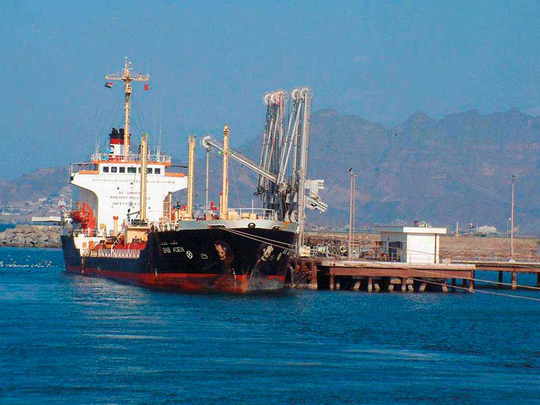
Al Mukalla: Yemen’s western city of Hodeida is once again in the glare of media and public attention as the internationally-recognised government and the Saudi-led coalition threaten to oust Iran-backed Al Houthi militants from the strategic city, their remaining major enclave on the Red Sea.
The Yemen president, senior government officials and the Saudi-led coalition spokesperson have been speaking in chorus about bringing back the city of Hodeida to government’s control, confirming prospects of an imminent major offensive in the city. Supporters say that the offensive would stop Al Houthi’s major source of finance that fuels the war and will put an end to smuggling of arms from Iran. Critics predict a tough battle that would worsen the already grave humanitarian condition in the city.
Important location
For more than two decades, the city of Hodeida has been the country’s number one commercial hub because of its seaport where most goods come through. The province of Hodeida is famous for having a long coastline and vast agricultural land. Hodeida is divided into 26 district and hosts almost 11 per cent of Yemen population, according to official figures. Shortly after taking control of the capital, Sana’a, Al Houthis stormed Hodeida and its seaport and began sending huge revenues to their private coffers. Yemeni government and the coalition have repeatedly accused the rebels of turning the major seaport into an entry point for arms supplies from Iran and squandering billions of riyals in revenues by spending them on their military efforts.
Military pressure
Army commanders in Yemen say Yemen President Abd Rabbo Mansour Hadi has resisted pressure from many international powers to scrap the plan and alternatively engaged in talks with the rebels amid fears that the predicted military operation would put lives of thousands of civilians at risk.
“President Hadi has rejected many calls to put off the offensive. Soldiers are ready to attack the city, but waiting for the green light from the president,” Major Mohsen Khasrouf, the chief of Yemen’s Armed Forces Moral Guidance Department told Gulf News.
On April 15, General Ahmed Assiri, the coalition spokesman, said in Paris that the only “sustainable” solution to Al Houthi mismanagement of Hodeida is to put it under the control of Yemen government. The United Nations has turned down a suggestion by the coalition to place the seaport under its supervision.
Khasrouf said that thousands of soldiers from Hodeida and other provinces have ended intensive military training in the army’s camps in Marib and they would be the core of the forces that would attack Hodeida. Supporters of the offensive say the liberation of the city would dry up Al Houthi’s major source of fund, end arms smuggling and push the rebels into accepting previous peace agreements.
In its last report that was released earlier this month, Abaad Centre for Strategic Studies, predicts that the offensive will be an extension of current Golden Arrow Operation and would “cut off major revenues” that stock up Al Houthi military operations across Yemen.
“It will also lead to curbing smuggling of Iranian-made arms to Al Houthi militia and securing the world maritime route in the Strait of Bab Al Mandab against missile and suicide attacks on commercial vessels and military ships that sail through the Red Sea.” the report said. The other sought outcome of the offensive is “maximising chances of peace in Yemen” by forcing the rebels into accepting UN Security Council resolution 2216 which obliges them to disarm and pull out of cities under their control, the report said.
Offensive
About the nature of the assault, military experts say government forces that are close in on Khokha, south of Hodeida, might meet in the city with other forces that are battling the rebels in Medi, north of Hodeida. Some military officers rule out this scenario, saying government forces would have to push Al Houthis from a large swathe of heavily mined areas before reaching Hodeida, which could take weeks if not months.
A senior security general who spoke to Gulf News on conditions of anonymity said that the most likely scenario is a heavy air bombardment on rebels’ positions to smooth the ground for government and coalition forces to make landfall from the coalition’s navy.
The Abbad Centre’s report said that the Al Houthis who have been weakened by a series of defeats on fronts would not confront the attacking forces. “Government and the Arab coalition can win the battle of Hodeida as they have trained military forces, advanced weapons, supply lines, airspace superiority and support from international powers,” the report noted.
Military critics argue that the coalition has given Al Houthi fighters enough time to prepare their defences, deploy new forces and plant floating landmines off the key seaport. Abbad responds that Al Houthis have no grass roots ties and mainly count on renegade army units loyal to ousted president to maintain their grip on the city.
As the argument goes on about the predicted offensive, analysts believe that the liberation of Hodeida could herald a turning point in the war against Al Houthi.












